Special Thanks
Special thanks for contributions and ideas for today's issue from Robert Gray, Robin Lenz, Davida Breier, Len Vlahos, Eileen Dengler and Tobias Mutter!
Special thanks for contributions and ideas for today's issue from Robert Gray, Robin Lenz, Davida Breier, Len Vlahos, Eileen Dengler and Tobias Mutter!
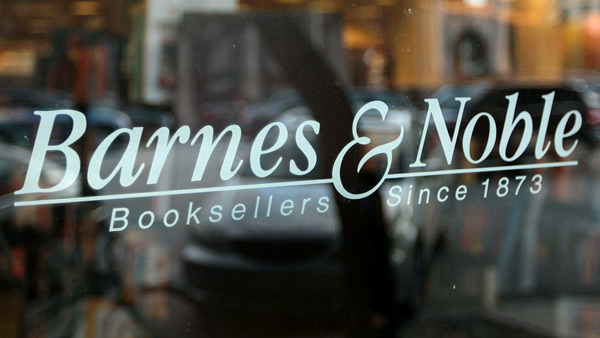 In a striking indication of how far Barnes & Noble will go in the process of reinventing itself, B&N chairman Len Riggio has fired himself and his brother, vice-chairman Steve Riggio. According to a memo to all B&N employees, Riggio said that the Riggios were told of the decision late yesterday morning and escorted from company headquarters in New York City after being allowed to collect personal items from their offices.
In a striking indication of how far Barnes & Noble will go in the process of reinventing itself, B&N chairman Len Riggio has fired himself and his brother, vice-chairman Steve Riggio. According to a memo to all B&N employees, Riggio said that the Riggios were told of the decision late yesterday morning and escorted from company headquarters in New York City after being allowed to collect personal items from their offices.
Riggio called the decision a "difficult" one and part of the ongoing process of "remaking B&N into a 21st-century retailer that can meet all digital challenges." In an effort to find resources that can be invested in the growing digital side of the business, the company has regularly looked at personnel cost structures, including "salaries, benefits, long-term liabilities and deferred compensation," he wrote. "As many of you know, in the past several years we had identified significant cost savings at the store level and among managers and buyers on the book side of the business. Eventually we looked at the executive level and discovered extraordinary possibilities for savings. Frankly, I'm not sure why we didn't look there earlier." He noted, too, that the Riggios' departure may make the company more attractive to the groups that have unenthusiastically considered purchasing the company since it put itself up for sale last year. Riggio thanked the Riggios for their many years of service and noted in particular that Len Riggio had nearly singlehandedly built the company from a college bookstore near New York University into the world's largest bookstore. Riggio recalled that Riggio had bought Barnes & Noble and B. Dalton Bookseller, the latter of which immediately made the company into a national, household name. He remembered, too, that Riggio had bought B&N College from Riggio, bought B&N.com from Riggio, bought GameStop from Riggio, bought Software, Etc. from Riggio, bought Babbage's from Riggio and bought perhaps a few other entities from himself that he kept hidden from the board. He called it "a stroke of genius" to have family foundations rent various properties to B&N and described Riggio as "crafty but adorable. Ya gotta love the guy!"
Riggio also noted that in connection with the two layoffs, Barnes & Noble will take a one-time charge of $400 million.
Because the Riggio brothers' B&N e-mails were shut down after their firing, Shelf Awareness was unable to contact with them. But at 4 a.m., we received an e-mail from WorldsLargest&BiggestBookseller@aol.com, saying, "You know I don't read the press and I don't care what the press says about me, I mean, what the press says about Mr. Leonard Riggio (which reminds me that I didn't like the phrasing in the third sentence of the story you had on the Nook last Tuesday), but you have to acknowledge that the guy is pure genius. Everything he touches is gold, even his parachute. And I have to insist once again that you not call that former employer a chain. Instead, my friend, it is a network of booksellers, may God save them all from Ron Burkle."
At 4:10 a.m., LuckyBro@aol.com wrote, "What Len said. I mean what that other guy wrote you."
Amazon founder and CEO Jeff Bezos was briefly detained by local police in southern Washington State near the Oregon border late Wednesday night, according to the Vancouver Gazette. Bezos was charged with speeding and driving with an expired license.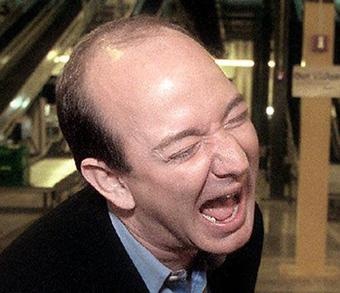 In an exclusive interview with Shelf Awareness, Bezos admitted to driving his 2011 Lexus "significantly" above the posted limits at a rate of speed that was nearly twice as fast as the last time he drove in that area a week earlier, or "more than a triple digit percentage increase." He was also, he said, several car lengths ahead of one car and nearly 20 behind another. Trees lining the road swept past at a rate of 212 per minute during the last mile before he was pulled over. However, he declined to state how many miles per hour he was driving.
In an exclusive interview with Shelf Awareness, Bezos admitted to driving his 2011 Lexus "significantly" above the posted limits at a rate of speed that was nearly twice as fast as the last time he drove in that area a week earlier, or "more than a triple digit percentage increase." He was also, he said, several car lengths ahead of one car and nearly 20 behind another. Trees lining the road swept past at a rate of 212 per minute during the last mile before he was pulled over. However, he declined to state how many miles per hour he was driving.
At the time of the incident, Bezos was on a regular late-night run to Portland from his house in Seattle to pick up a coffee at Starbucks, a few groceries and toothpaste. Despite being 150 miles away, Oregon, he noted, has no sales tax, which makes for "an optimal shopping experience."
Concerning the driver's license, Bezos said that the State of Washington's department of licensing does not use EDI standards compatible with Amazon, delaying his renewal of the license. He proposed that the state join Amazon's Government Prime, a new affiliate program that on the new interactive Kindle handles a variety of transactions such as tickets and pleas, deed registration, building permits, graft payments, as well as driver's license renewals. "You can download your license directly to your new award-winning Kindle in less than a minute," Bezos said excitedly. "You can send that sewer utility payment in with just the press of a button." Government Prime does not work, however, for sales tax collection.
The speed trap personally annoyed Bezos, he added. "In most any other state we don't collect sales tax so local governments have to cut back on superfluous services like police. But in Washington we have an undeniable presence--and as a result, they nailed my Lexus, my nexus and my ass!"
 In a conference call yesterday, Borders Group unveiled its long-promised reorganization plan. "We're going back to the basics, the ABCs of the business," CEO Mike Edwards said by way of introduction, adding that A, B and C refer to "the first three letters of the alphabet, traditionally a metaphor for the basics, which we are returning to."
In a conference call yesterday, Borders Group unveiled its long-promised reorganization plan. "We're going back to the basics, the ABCs of the business," CEO Mike Edwards said by way of introduction, adding that A, B and C refer to "the first three letters of the alphabet, traditionally a metaphor for the basics, which we are returning to."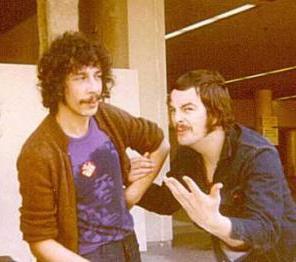 A key element of the plan includes the possible return of Tom and Louis Borders, the founders of the company, both of whom have not been associated with Borders in almost 20 years. "We have sent e-mails to Tom and Louis, who we believe would like to rescue from infamy the company that bears their name," Edwards said. "The thinking is this could be a Steve-Jobs-returns-to-save-Apple kind of thing." Asked several times about the Borders brothers' response, Edwards indicated that the company had not yet heard from them yet, probably, he said, because they are busy working on a turnaround plan and praying.
A key element of the plan includes the possible return of Tom and Louis Borders, the founders of the company, both of whom have not been associated with Borders in almost 20 years. "We have sent e-mails to Tom and Louis, who we believe would like to rescue from infamy the company that bears their name," Edwards said. "The thinking is this could be a Steve-Jobs-returns-to-save-Apple kind of thing." Asked several times about the Borders brothers' response, Edwards indicated that the company had not yet heard from them yet, probably, he said, because they are busy working on a turnaround plan and praying.
Another part of the plan involves digital initiatives. "We've identified a major area for expansion in the digital realm," Edwards said. Noting the traditional popularity of blank books in the stores' stationery and journal sections, Edwards said that Borders will soon begin selling blank e-books. "They'll come in varying lengths to accommodate all tastes," he said. "And they'll be in ePub format, allowing them to be used on all devices except the Kindle." He noted, too, that at present there is no competitive product on the market.
The company also will begin offering a new kind of book-related sideline that harkens back to old-time reading enjoyment, something so good "it's addictive," he said. "With help generously extended by chairman Bennett Lebow, we plan to begin selling in stores Pyramid, Jade, Eve 120, Liggett Select and Quest-brand paper-tube-encased, dried-and-cured organic agricultural products." Because all states prohibit smoking indoors, a use-area for the new products will be created outside each store, Edwards added, marking the retailers' first expansion en plein air and its first product that involves combustion.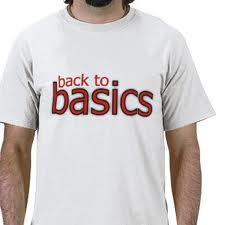 As another key part of the reorganization, Borders has created a new position, chief book officer, for which it is currently in the process of recruitment. The main responsibility is to oversee everything at Borders having to do with the book. "By that, we mean quite literally the book," Edwards said, "since we will be reducing inventory to focus on just one title a season." This book, he continued, will be a surefire bestseller that the company will promote online and in all stores, titles to which the company is devoting an incredible amount of shelf space since there will be no competing titles. "The laser-like focus we will bring to this new program will draw on all that the company has done and accomplished in its nearly 40-year history," he added.
As another key part of the reorganization, Borders has created a new position, chief book officer, for which it is currently in the process of recruitment. The main responsibility is to oversee everything at Borders having to do with the book. "By that, we mean quite literally the book," Edwards said, "since we will be reducing inventory to focus on just one title a season." This book, he continued, will be a surefire bestseller that the company will promote online and in all stores, titles to which the company is devoting an incredible amount of shelf space since there will be no competing titles. "The laser-like focus we will bring to this new program will draw on all that the company has done and accomplished in its nearly 40-year history," he added.
At the end of the conference, Edwards noted that management has identified another 269 "poorer-performing" stores that it plans to close during the summer. After the closings, Borders will operate one superstore, which Edwards called "the ultimate" in returning to the company's roots.
 New hire: Shelf
Awareness is pleased to announce a new addition to our staff. James Mutter (the furrier one in photo at left) will serve as executive assistant
to editor-in-chief John Mutter, and will be responsible for shedding, shredding,
stress relief and copy editing. James has previously been an intern at the Shelf.
New hire: Shelf
Awareness is pleased to announce a new addition to our staff. James Mutter (the furrier one in photo at left) will serve as executive assistant
to editor-in-chief John Mutter, and will be responsible for shedding, shredding,
stress relief and copy editing. James has previously been an intern at the Shelf.
---
Whyaduck
Enterprises, Silicon Valley, Calif., has introduced an innovative
dedicated e-reader that projects the text of
books directly into the eyeballs. At this time the stylish-looking
reader
handles only plain black-and-white text;  updated versions will be
colorized.
The reader, called the Groucho (after the man who once said, "Outside of a dog, a book
is man's best friend. Inside of a dog it's too dark to read"), works best
when used with texts in the public domain. The devices will be sold at
novelty shops and bookstores; prototypes will be available at BEA.
updated versions will be
colorized.
The reader, called the Groucho (after the man who once said, "Outside of a dog, a book
is man's best friend. Inside of a dog it's too dark to read"), works best
when used with texts in the public domain. The devices will be sold at
novelty shops and bookstores; prototypes will be available at BEA.
---
After marking its first year, the Never-Ending Conference (Shelf Awareness, April 1, 2010) is going strong and may even meet on occasional weekends, according to show director Steve Rosato. He noted OVERKILL's new partnership with Publishers Launch, lunched last month by frequent Never-Ending Conference moderators and panelists Mike Shatzkin and Michael Cader, which will expand the program abroad. "We're all looking forward to conferences in non-English speaking territory," Rosato said. "If we talk fast enough, we can say anything we want and people will just think it's all that much more important."
Highlights of the upcoming year's program include a keynote address during OVERKILL's BEA event that will feature an actual person who has not spoken before at OVERKILL or any other industry events. "We're having some difficulty locating such a person," he said. "So I'd like to put a shout out here if anyone knows anyone...." And Mike Shatzkin is working on a session tentatively titled, "The Inevitability of Death and Taxes: You D@#!mn-Well Know I'm Right."
---

Twitterers were commenting yesterday on this charming bookend, part of a collection featuring alarmingly realistic sculptures, available at Dog Ears Bookstore, Dog Eared Books, Black Dog Books, Brown Dog Books, Stray Dog Bookstore, the Spotty Dog, the Lazy Dog, the Barking Dog, the Damn Dog and other stores.
---
 One of our
readers sent this photo of her handy new portable bookshelf, which carries your tomes
wherever you go. This multipurpose storage rack comes in various sizes and colors. Sure, an electronic reader might be more convenient, but
like so many of you, we do love the smell of our printed volumes.
One of our
readers sent this photo of her handy new portable bookshelf, which carries your tomes
wherever you go. This multipurpose storage rack comes in various sizes and colors. Sure, an electronic reader might be more convenient, but
like so many of you, we do love the smell of our printed volumes.
---
Book trailer of the day: In and Out with Dick and Jane: A Loving Parody by Ross MacDonald and James Victore (Abrams Image, $14.95, 9780810997592).
---
Effective today, April 1, Miskatonic University Press will be distributed by Hopkins Fulfillment Services.
Located in Arkham, Mass., Miskatonic University is world renowned for its collection of rare texts. "Partnering with HFS, known for their superior service to university presses, was a natural match," said Miskatonic University librarian Dr. Henry Armitage.
Next year the press plans to publish a revised edition of the Necronomicon, which will include an interactive e-book, with a new text-to-incantation feature. HFS will also be responsible for the dissemination of the Pnakotic Manuscripts and the R'lyeh Text.
The Press's board of directors, known affectionately as the Elder Ones, commented: "We appreciate what fresh blood will do for our spring list." On a related note, the press's prior distributor could not be reached.
"I always suspected it would come to this," said Davida Breier, manager of Hopkins Fulfillment Services.
 Last year's false rumor that newly acquired Boston Red Sox outfielder Carl Crawford wanted to open an antiquarian bookstore turns out to have been a diversionary tactic. Baseball and books are a team after all.
Last year's false rumor that newly acquired Boston Red Sox outfielder Carl Crawford wanted to open an antiquarian bookstore turns out to have been a diversionary tactic. Baseball and books are a team after all.
Fans arriving at stadiums this week for Opening Day are seeing an unexpectedly bookish addition to the usual array of food courts and souvenir stands. Every ballpark now has an official MLB Pop-up Bookshop, thanks to a last-minute deal worked out between Major League Baseball and the American Booksellers Association. The kiosks, designed to resemble dugouts with bookshelves, feature airport bookstore inventory, but with a distinctively indie staff picks twist. The idea for this project came about last summer when Geoffrey Jennings of Rainy Day Books, Fairway, Kan., read an article in the Kansas City Star about dwindling attendance at Royals games. The team drew an average of just under 20,000 fans per game in 2010, compared with 46,000-plus for the New York Yankees.
The idea for this project came about last summer when Geoffrey Jennings of Rainy Day Books, Fairway, Kan., read an article in the Kansas City Star about dwindling attendance at Royals games. The team drew an average of just under 20,000 fans per game in 2010, compared with 46,000-plus for the New York Yankees.
The article was accompanied by a photograph of a Royals fan, sitting by himself in an otherwise empty section and reading a book during the game. Baseball, with its slow pace and intermittent action, is a sport particularly suited to the reading life.
"My first thought was 'baseball and reading: the perfect combination.' Most people wouldn't bring a book to the stadium, but they might buy one there," said Jennings. "So I made an appointment with the Royals P.R. department. They were very receptive to the idea, and by mid-August we had a rudimentary pop-up bookstore in place at Kauffman Stadium."
The experiment proved to be such a success that Jennings shared his story with colleagues during the Midwest Booksellers Association fall trade show, and ultimately with ABA's Len Vlahos. 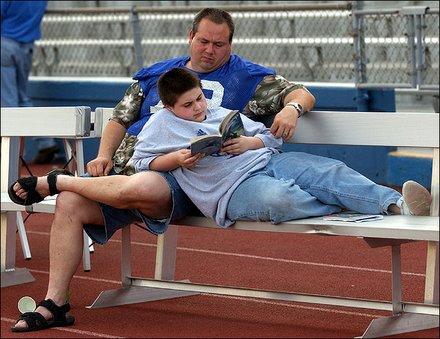 "After that, things moved fast," said Vlahos, who approached other regional bookseller associations to help coordinate the plan. Using Jennings's initial connection with the Royals' front office, Vlahos was able to meet with MLB officials and work out a preliminary deal that has resulted in the soft opening of MLB Pop-Up Bookshops this week. Proceeds from sales will be split between the regional associations and MLB. The kiosks and promotional materials feature three logos--MLB, ABA and the appropriate regional association.
"After that, things moved fast," said Vlahos, who approached other regional bookseller associations to help coordinate the plan. Using Jennings's initial connection with the Royals' front office, Vlahos was able to meet with MLB officials and work out a preliminary deal that has resulted in the soft opening of MLB Pop-Up Bookshops this week. Proceeds from sales will be split between the regional associations and MLB. The kiosks and promotional materials feature three logos--MLB, ABA and the appropriate regional association.
At one point during the negotiations, MLB executives began exploring a possible deal with Barnes & Noble or Hudson News, but the ABA and regional associations kept the pressure on, pointing out that shopping local is important for big cities, too. The chains--like a pop-up, an easy out--were soon gone from the scene.
The negotiations were top secret. "We weren't absolutely sure until the last minute if this was going to come together, so we couldn't announce it until now," said Vlahos. "We think it's another great new way to get the 'shop indie' message across."
MLB Pop-Up Bookshops will carry books only. MLB spokesman Rick Simpson said, "We already sell non-book items at our concession stands, and we decided that magazines would not create the right impression on television. A fan reading a book is multi-tasking; a fan flipping through a magazine just looks bored."
Although MLB is putting a positive spin on the addition of bookshops in all stadiums, some analysts say the real advantage will be for bad teams like the Royals and Pittsburgh Pirates, who struggle to attract fans as the season wears on and wears out. At least three teams are already planning late-summer Bookmark Nights.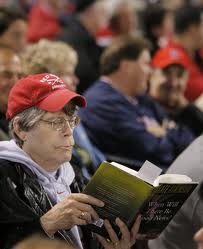 Even good teams can take advantage of the option, however. Book lovers are everywhere, on the field and off. St. Louis Cardinals manager Tony LaRussa "is an avid reader who would like to own a bookstore." Chicago Cubs outfielder Fernando Perez is a published poet who studied creative writing at Columbia University. And World Series hero Brian Wilson, the quirky closer for the champion San Francisco Giants, "has an abiding interest in crossword puzzles" and recently fulfilled a lifelong dream when he became a New York Times crossword clue.
Even good teams can take advantage of the option, however. Book lovers are everywhere, on the field and off. St. Louis Cardinals manager Tony LaRussa "is an avid reader who would like to own a bookstore." Chicago Cubs outfielder Fernando Perez is a published poet who studied creative writing at Columbia University. And World Series hero Brian Wilson, the quirky closer for the champion San Francisco Giants, "has an abiding interest in crossword puzzles" and recently fulfilled a lifelong dream when he became a New York Times crossword clue.
The Red Sox owners sponsor the Great Fenway Park Writers Series, and the Boston Globe boasted that "only in one major or minor city could a sports franchise fuse the disparate passions of baseball and books into an enterprise as successful as this."
Sound like fighting words to me. Will MLB's Pop-Up Bookshops answer that challenge? On Opening Day, anything's possible.--Robert Gray
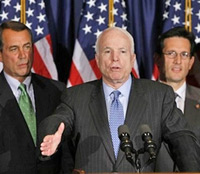 The Republican leadership in the House has introduced H.R. 2, the Making Select Parts of America Even Greater Act, which Rep. Eric Cantor (R.-Va.) said is based on the party think tank's latest idea for revolutionizing the federal government: a reverse tax whereby corporations and their top executives will receive regular payments from the federal government. The change in approach will, he emphasized, solve several problems at once, most notably rendering concern about the rising federal deficit moot because now federal outlays will go to those in the country who deserve it most. "It's not that we're against entitlements," Cantor explained. "At issue is defining who's entitled."
The Republican leadership in the House has introduced H.R. 2, the Making Select Parts of America Even Greater Act, which Rep. Eric Cantor (R.-Va.) said is based on the party think tank's latest idea for revolutionizing the federal government: a reverse tax whereby corporations and their top executives will receive regular payments from the federal government. The change in approach will, he emphasized, solve several problems at once, most notably rendering concern about the rising federal deficit moot because now federal outlays will go to those in the country who deserve it most. "It's not that we're against entitlements," Cantor explained. "At issue is defining who's entitled."
The bad news for the book world is in addition to having Social Security withholding redirected, the reverse revenue stream will be paid for by "sin" levies on products, entities and services that Cantor characterized as "wasteful, subversive, liberal, thoughtful and, well, generally helpful to people." In other words, books, publishers and bookstores will become a new "funding source." The only good news is the extensive list of book world exclusions: conservative imprints at major houses, all of Rupert Murdoch's HarperCollins, and, out of professional courtesy, vampire books. In addition, under a "friend or foe clause," companies may apply for the exemption if they can prove a sufficient mix of these elements: non-payment of corporate taxes; moving jobs outside the U.S.; outsourcing jobs to companies that don't pay benefits; maintaining an astronomical ratio of pay between the highest-paid and lowest-paid staff; cutting benefits to remaining staff; and contributions to Tea Party candidates.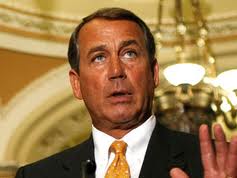 Under the bill, a board of examiners called the Liberty Panel will assess taxes on a sliding scale. In deference to what Cantor called "our commitment to some ideas," part of the revenue will go to a new publishing initiative called Earl Grey Books. Its first list will include The Collected Works of John Boehner and several novels that former Speaker Newt Gingrich inadvertently left behind in his office when he resigned in 1998. "With his non-candidacy candidacy for president, there should be increased interest in Newt's titles," Cantor said. "Besides, his bizarre alternate histories fit the country's current loathing of rational discourse and rational thought."
Under the bill, a board of examiners called the Liberty Panel will assess taxes on a sliding scale. In deference to what Cantor called "our commitment to some ideas," part of the revenue will go to a new publishing initiative called Earl Grey Books. Its first list will include The Collected Works of John Boehner and several novels that former Speaker Newt Gingrich inadvertently left behind in his office when he resigned in 1998. "With his non-candidacy candidacy for president, there should be increased interest in Newt's titles," Cantor said. "Besides, his bizarre alternate histories fit the country's current loathing of rational discourse and rational thought."
All returns of printed books will replace the monies that until recently went to the program that provided heating oil subsidies for the poor--recipients will need to document that their homes have stoves or fireplaces so that they can make full use of the books.
Another major Earl Grey Books title for the fall is an updated version of 1984. Although he said he finds it a bit too Orwellian at times, Cantor is particularly excited about this book, which is being retitled 2011. "It's so good, we might label it nonfiction," he said rhapsodically. "War Is Peace! Freedom Is Slavery! Ignorance Is Strength! We couldn't make this stuff up!"
In response to the ongoing lawsuits pitting major associations and companies against one another--including the Association of American Publishers and the Authors Guild vs. Google, Microsoft vs. Barnes & Noble and Apple vs. Amazon--the American Booksellers Association has decided to join the crowd and plans to file a major lawsuit by the end of the summer, according to Bookselling This Week.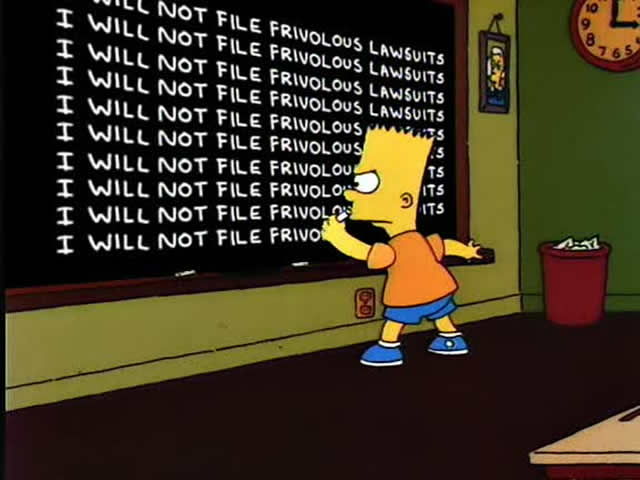 In explaining the initiative, ABA CEO Oren Teicher said, "We at the ABA would like to remind the book world that in the modern era of blockbuster lawsuits, we were pioneers with our 1994 lawsuit against five publishers--Houghton Mifflin, Penguin, St. Martin's, Rutledge Hill and Hugh Lauter Levin--the 1995 lawsuit against Random House and our 1998 action against Barnes & Noble and Borders. These were, we believe, the first involving associations and major companies in the industry, a distinction that has been lost on many. Besides, we're feeling kind of left out."
In explaining the initiative, ABA CEO Oren Teicher said, "We at the ABA would like to remind the book world that in the modern era of blockbuster lawsuits, we were pioneers with our 1994 lawsuit against five publishers--Houghton Mifflin, Penguin, St. Martin's, Rutledge Hill and Hugh Lauter Levin--the 1995 lawsuit against Random House and our 1998 action against Barnes & Noble and Borders. These were, we believe, the first involving associations and major companies in the industry, a distinction that has been lost on many. Besides, we're feeling kind of left out."
The ABA does not yet have a target for its lawsuit. "With our lawsuits in the '90s, we largely achieved our goal of creating a level playing field," Teicher said. "But then the playing field kind of leveled us." Teicher quickly added: "That also applies, I should note, to our friends in Ann Arbor and on lower Fifth Avenue."
Teicher admitted that Amazon would be a logical target but that Apple, which has "far superior resources," has already sued the online retailer, and "this is not about copy cat suits." State governments that don't require Amazon to collect sales tax would be another likely defendant, but governments are difficult to sue. Hachette Book Group is another possible target for botching the shipments of The Pale King, but Teicher said such an action lacked the wide reach that the suit should have. As a result, the association will leave the decision of whom or what to sue up to ABA members and make it part of the Indies' Choice award program. "Members will be able to vote simultaneously for their favorite books and authors and against their favorite industry bugbears," Teicher said. "Perhaps they will vote both for and against certain books and authors. In any case, it will be an exciting experiment in democracy and another pioneering move by the ABA." Winners of the Indies' Choice Awards will be announced as usual at a luncheon at BEA; this year the winner of the lawsuit competition will be a centerpiece of the luncheon program.
As a result, the association will leave the decision of whom or what to sue up to ABA members and make it part of the Indies' Choice award program. "Members will be able to vote simultaneously for their favorite books and authors and against their favorite industry bugbears," Teicher said. "Perhaps they will vote both for and against certain books and authors. In any case, it will be an exciting experiment in democracy and another pioneering move by the ABA." Winners of the Indies' Choice Awards will be announced as usual at a luncheon at BEA; this year the winner of the lawsuit competition will be a centerpiece of the luncheon program.
The ABA has already begun preparations for the lawsuit. COO Len Vlahos has enrolled in night school and will soon start several law courses. Bill Petrocelli of Book Passage, Corte Madera, Calif., who praised the move by the ABA, has signed on as a legal advisor. (He commented, "I'd really like to go after B&N and Borders again, but they're in such pathetic shape, it would be like stealing candy from a baby. Mmm, then again....")
C-Span2's Book TV will make its initial foray into reality television with The Real Booksellers of BEA, a series chronicling the adventures--and misadventures--of five young booksellers turned loose in Manhattan during this year's BookExpo America. The series is scheduled to air in 13 episodes this summer.  Although a cast has already been set, their identities will not be revealed until BEA to enhance, as much as possible, the "reality factor" of their experience, according to a spokesperson for C-Span2, who also said the booksellers represent five distinct geographical sections of the country and will be sharing a suite at an unnamed, but "decidedly upscale," New York hotel for the week.
Although a cast has already been set, their identities will not be revealed until BEA to enhance, as much as possible, the "reality factor" of their experience, according to a spokesperson for C-Span2, who also said the booksellers represent five distinct geographical sections of the country and will be sharing a suite at an unnamed, but "decidedly upscale," New York hotel for the week.
During BEA, Book TV's cameras will follow the booksellers as they "work the floor" at Javits Center during the day, then head out on the town each night, moving from publisher-sponsored cocktail parties and dinners to "all the varieties of nightlife that only New York City has to offer."
"Sparks will fly," said C-Span's spokesperson, adding, "It's about the books, of course, but it's also about the booksellers who get behind the books."
Books & Books owner Mitchell Kaplan is executive producer of The Real Booksellers of BEA, the first television venture for his Mazur/Kaplan Company, which has previously focused on book-to-film projects like The Guernsey Literary and Potato Peel Pie Society, Delirium and Major Pettigrew's Last Stand.
"What happens at BEA stays at BEA. That used to be the motto," said Kaplan. "This year we draw back the curtain a bit. Who knows what we'll find there."
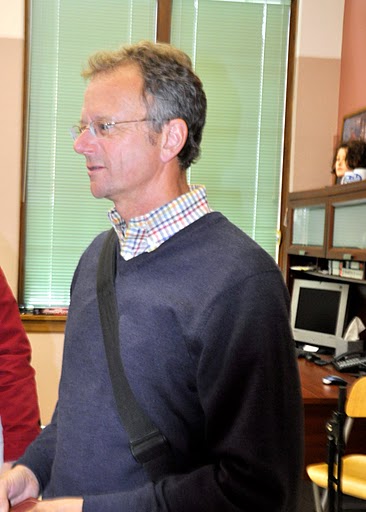 Following the departures in the last year of three executive directors of the nine regional booksellers associations, the remaining executive directors, all but one of whom have tenures dating back to the mid-1990s, are resigning, too. Even Steve Fischer, head of NEIBA since 2006, is going. "Until last year I was the new kid on the block," he said. "I simply can't handle becoming the eminence grise overnight."
Following the departures in the last year of three executive directors of the nine regional booksellers associations, the remaining executive directors, all but one of whom have tenures dating back to the mid-1990s, are resigning, too. Even Steve Fischer, head of NEIBA since 2006, is going. "Until last year I was the new kid on the block," he said. "I simply can't handle becoming the eminence grise overnight."
In a joint statement after spending the past week at the beach in South Carolina, the resigning executive directors said that their decisions were entirely coincidental. The group continued: "We all came to the identical conclusion that Susan [Walker], Jim [Dana] and Lisa [Knudsen] are onto something. Nowadays they all sound so, well, happy. 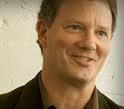 And after a cumulative total of at least 80 fall conferences and trade shows, untold conference and trade show reinventions, 200-300 seasonal meetings, many hundreds of board meetings, thousands of 'gatherings' and 'get-togethers' and 'neighborhood thises and thats' and dealing with hundreds of hotels and convention centers, we're too tired to count any more."
And after a cumulative total of at least 80 fall conferences and trade shows, untold conference and trade show reinventions, 200-300 seasonal meetings, many hundreds of board meetings, thousands of 'gatherings' and 'get-togethers' and 'neighborhood thises and thats' and dealing with hundreds of hotels and convention centers, we're too tired to count any more."
Jennifer Bigelow, Eileen Dengler and Wanda Jewell plan to extend their traditional beach vacation into a perpetual vacation. Hut Landon, Thom Chambliss and Fischer are considering doing something "nice," like following Jim Dana's lead and joining the Peace Corps, where they said they could teach Third World people about organizing and publishing holiday catalogues, obtaining reasonable hotel conference rates and dealing with difficult trade reporters.